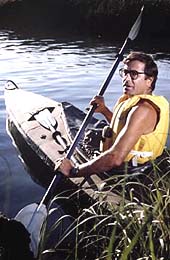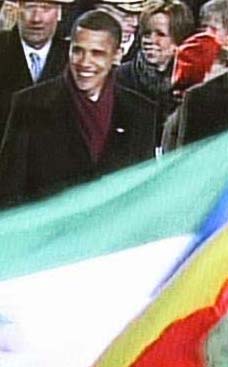
"The best travelers are those who have a home, who are not looking for the Great Good Place, or another life - say, meeting a Thai woman and setting up house in a village outside Chiang Mai (tempting though that is). When I was in Medford I always thought: The world is elsewhere, but I kept returning to Medford. An intrepid Medford traveler was the writer-boatsman Nathaniel Bishop, who in the late 19th century sailed in small boats down the East Coast ("Voyage in a Paper Boat," "Four Months in a Sneak-Box," and other books). I set off from Medford in 1963 and, although I have been to the ends of the earth, here I am still in the general area for much of the year." Author Paul Theroux served as a Peace Corps Volunteer in Malawi in the 1960's.
To understand what drives Paul Theroux, novelist and dean of American travel writers, consider this: He once decided to walk out the front door of his Medford home, climb on an MBTA train pointed south, and keep riding the rails until they ended at the bottom of South America
Far-sighted
Paul Theroux discusses his globe-girdling journeys, his books, and the roots of his wanderlust
February 22, 2009
To understand what drives Paul Theroux, novelist and dean of American travel writers, consider this: He once decided to walk out the front door of his Medford home, climb on an MBTA train pointed south, and keep riding the rails until they ended at the bottom of South America. The result was "The Old Patagonian Express."
In four decades, Theroux has written many acclaimed travelogues (his latest, "Ghost Train to the Eastern Star," retraced his first, "The Great Railway Bazaar" to see what's changed), along with story collections ("The Stranger at the Palazzo d'Oro"), and novels ("The Mosquito Coast").
In his travel books, Theroux gives equal time to his experiences and his reactions, delivering searing observations that are both personal and pointed. He always travels with a few books he's saved for the journey, and which become part of the narrative as he reads them. With the help of several Globe travel writers and editors, we assembled some questions for Theroux on the art of travel writing. The questions and his answers appear below.
Q. What sort of reader do you have in mind when you set out on a trip? Is it the likely traveler, the armchair visitor, or do you simply write for yourself?
A. I published my first book 41 years ago, and ever since have assumed that my ideal reader is someone with my general outlook on the world, or someone whose mind I can help to mold: humane, ironical, passionate about reading. As for the writing itself, I subscribe to Joseph Conrad's dictum: "I write, above all, to make you see."
Q. "Experience of place" is formed by the realities of a locale - its culture, climate, and history - and how a visitor passes through all that. When you eventually write, how much in the end is you, and how much that spot? What becomes the "defining force of the narrative"?
A. The "defining force of the narrative," any narrative, fiction or nonfiction, is my own sensibility, buoyed by my imagination. I am not writing a geography book, or a book of facts, though there is geography and factuality in my travel writing. It is memoir, as close as I will get to autobiography. But I also think of my writing - all my writing - in painterly terms, and when I look for inspiration it is often to traveling painters, someone such as Edward Lear, who traveled in Egypt, India, Albania, Corsica, and southern Italy in the latter 19th century.
Q. Are there authors whom you consider great travel writers who are not generally thought of that way?
A. I often think the opposite. Graham Greene was in Mexico (for "The Lawless Roads") for only about six weeks, and in Liberia ("Journey Without Maps") for 18 days. Henry David Thoreau was in Maine for a matter of weeks, ditto Cape Cod and elsewhere, yet he wrote vividly about these short trips. Many of the great writers of travel have been timid travelers. Bruce Chatwin always traveled with an entourage and never stayed long anywhere. V. S. Naipaul always went accompanied by his mistress and a driver. Then, of course, there are bold travelers who are somewhat ignored - I think of Geoffrey Moorhouse, who tried to cross the Sahara from west to east around 1970 - a very difficult journey that he recounted in "The Fearful Void."
Q. With the increasing security hassles of getting to a place and the higher costs on arrival, what are the incentives for people to travel now, besides confirming that the Great Wall is in fact really great?
A. It's true there are huge hassles - and not interesting ones, not hardships which are wonderful to write about, but nuisances, which no one wants to hear about. Boswell asked Dr. Johnson if the Giants Causeway in Ireland was worth seeing. Johnson said, "Yes, worth seeing, but not worth going to see." The greatest incentive in travel is getting away from everything familiar - home and family and questions to which you don't have the answer.
Q. You must have preconceptions before visiting a place for the first time. How do you keep them from becoming blinders?
A. Preconceptions are often based on whispers, the fears or prejudices of other people, and they arise from either not talking to people, or talking to too few people. Bronislaw Malinowski had an answer. He was the anthropologist who studied the people in the Trobriand Islands, which I wrote about in "The Happy Isles of Oceania." He would not accept any statement until three or four different local people confirmed it.
Q. In a global era when someone can end up, with planning and a day's effort, on the other side of the world, much travel writing has become a service craft, as in: Go here and do this to find fun. What is the future,then, for the personal narrative of experience?
A. It's true that the travel narrative is evolving, as the world is. It's no problem to go to Vietnam, India, the Brazilian hinterland, rural Kenya, and so forth. But consider how some countries have closed up, become more dangerous and xenophobic and inaccessible - Afghanistan, the north of Pakistan, the remote provinces of Assam, and of course the poorer neighborhoods in the USA, in Jackson, Miss., in Los Angeles and elsewhere. Urban America has not had a great recent chronicler. Lastly, consider the fact that a few years ago an English journalist tried to cross the Congo following the route of [19th-centu ry explorer] Henry Morton Stanley - and was utterly defeated by the barriers, the soldiers, the river, hostile villages, and impossible roads. It is nearly as hard to travel on the ground in the Congo as it was in Stanley's time there on that great traverse because people are better armed now.
Q. There have been few travel writers as willing as you to roll up their sleeves, wade into a place, interact with its people, and respond. Yet you often seem critical, displeased, unsatisfied by what you find. Talk about this sequence of at once engaging with the unknown and then feeling that you must criticize and correct, as though to make things somehow better.
A. People say to me: How can I become a writer? I always say: one, leave home; two, tell the truth. I like to confront a place or a situation without any preconceptions - like witnessing my first bullfight (in "The Pillars of Hercules"). I am sometimes taken to task by people who say, "I was there, and it wasn't like that." I reply, "That was your trip - this is mine." I also think that being absolutely truthful gives prose a kind of prescience, since the truth is often prophetic. This was the case when I was extremely critical of the Chinese government in "Riding the Iron Rooster" in 1988. I got terrible reviews ("He's so grumpy! He's so negative about the Chinese bureaucracy!"), and then a year later came the Tiananmen Square massacre.
Q. A journey involves starting somewhere and going somewhere else. You grew up in Medford, lived in England and Hawaii, and summer on Cape Cod. Having traveled so often, what do you think of as home? How important is that concept of everyday comfort to you?
A. The best travelers are those who have a home, who are not looking for the Great Good Place, or another life - say, meeting a Thai woman and setting up house in a village outside Chiang Mai (tempting though that is). When I was in Medford I always thought: The world is elsewhere, but I kept returning to Medford. An intrepid Medford traveler was the writer-boatsman Nathaniel Bishop, who in the late 19th century sailed in small boats down the East Coast ("Voyage in a Paper Boat," "Four Months in a Sneak-Box," and other books). I set off from Medford in 1963 and, although I have been to the ends of the earth, here I am still in the general area for much of the year.
Q. You've written often about the Cape and the Islands. How do you approach getting a fresh perspective on the familiar?
A. The familiar is the hardest subject for any writer, and home is almost impossible to write about. I wonder how William Faulkner spent a whole career writing about what he called a place no larger than a postage stamp. I don't write intimately about the Cape - I'm a bit averse to. I have written about Medford with mixed emotions. I am obsessed with the varieties of accents in Eastern Massachusetts, the many accents in Boston. No one but a Bostonian knows how there is really no such thing as a Boston accent - there are many. In some of my fiction I have deliberately written about people saying "I hosey a bottle of tonic" and "He went swimming bollocky" because these are the voices of my youth.













